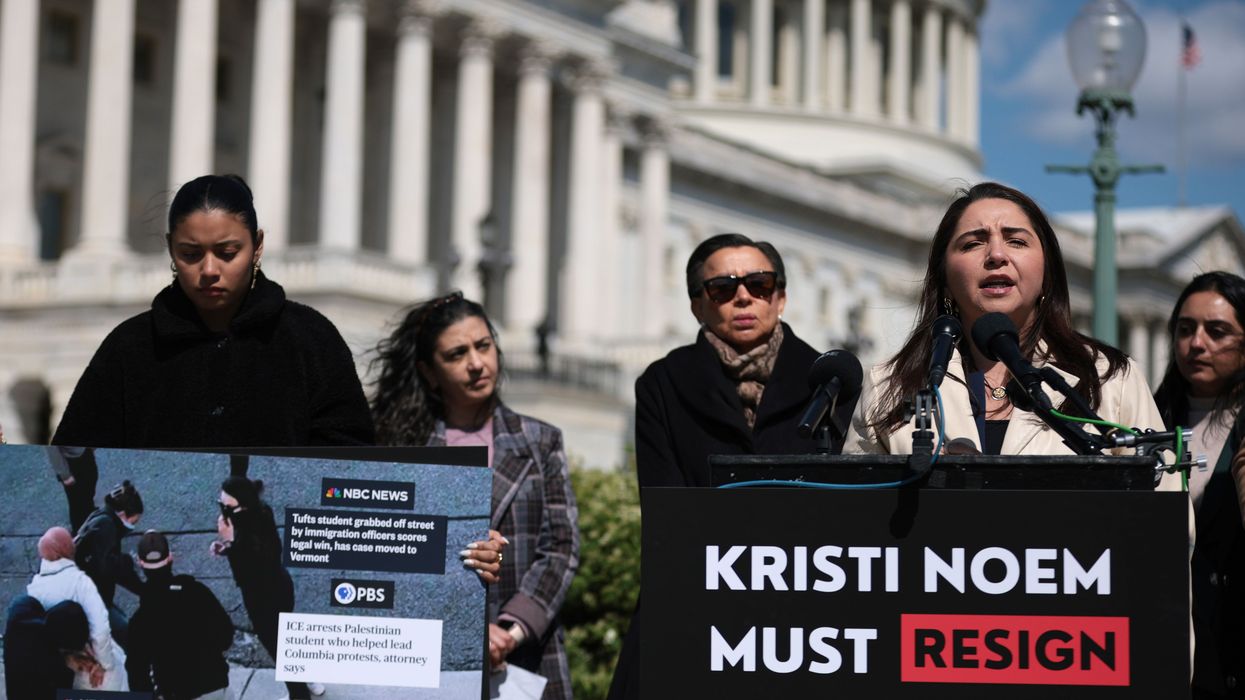May, 03 2023, 01:52pm EDT
American Immigration Council Unveils Blueprint for a Modern and Functional Border and Asylum System
A new vision and blueprint for the border released today by the American Immigration Council highlights the need for a modern and functional system of humanitarian protection and border management in the United States. The whitepaper, “Beyond a Border Solution: How to Build a Humanitarian Protection System That Won’t Break,” emphasizes the need for policymakers to abandon short-term solutionism and acknowledge that only sustained investment over a period of time can realistically address 21st century migration and displacement challenges.
As Title 42 is scheduled to sunset on May 11 and the Biden administration announces plans to manage an expected increase in migration at the southern border, this paper offers a roadmap for building a functional, flexible, and orderly asylum system that at the same time ensures effective border management.
The report draws extensively on government data and public reporting to assess the history of recent border management and subsequent presidential administrations’ responses to migration at the U.S. southern border.
The recommendations of the paper to the Biden administration and Congress include:
- Expand Customs and Border Protection’s capacity to process asylum seekers at ports of entry.
- Surge resources to U.S. Border Patrol for humanitarian processing.
- Establish a Center for Migrant Coordination to work with receiving communities.
- Grow federal support for case management alternatives to detention.
- Revamp asylum processing at U.S. Citizenship and Immigration Services.
- Begin clearing immigration court asylum backlogs.
- Construct noncustodial regional processing centers at the border.
- Execute the termination of Title 42.
- Fund a right to an attorney in immigration court.
- Create a Federal Emergency Management Agency-based Emergency Migration Fund.
- Increase legal immigration pathways.
- Build domestic and international refugee and asylum processing capacity in Latin America.
- Bring asylum law into the 21st century.
For decades, the United States has been a beacon of hope for people seeking freedom and safety. However, in the 21st century, the global displacement crisis has led to humanitarian migration at levels far above what the 20th-century system can handle. The current system is dysfunctional and failing to meet the needs of the government, border communities, and asylum seekers.
“The failure to build a modern and functional system of humanitarian protection has led to overcrowding, bottlenecks, and chaos at the border. But hope still exists,” said Aaron Reichlin-Melnick, policy director at the American Immigration Council. “America needs durable solutions, not simplistic soundbites. This means taking concrete steps right now that work to bring orderliness and fairness to the overwhelmed asylum process at our southern border, and to do so in a way that builds toward a long term set of solutions that work on the ground, reflect our values and serve our interests. Rebuilding a functional system does not require a radical overhaul of U.S. immigration law. We can build a system that reflects our values, is true to our laws, and has public support because it is in the interest of the nation.”
“America needs a serious plan for sustainable border solutions. The Council’s paper offers a blueprint for action that, taken together and implemented fully, will put a system in place that protects our borders, protects asylum seekers, and protects America’s moral standing as a safe haven and global leader in human rights. At the heart of this paper is the belief that the essential goals of meaningful humanitarian protection and effective border security can both be achieved. Our proposition is not ‘either or,’ rather it is ‘both and.’ How to make humanitarian protection and border security be the two sides of the same coin, is at the heart of the paper’s recommendations. We urge policymakers on both ends of Pennsylvania Avenue to read the recommendations and act to achieve lasting results,” said Angela Kelley, chief advisor, policy & partnerships at the American Immigration Council.
“The problem isn’t that too many people are seeking asylum. The problem is that the U.S. hasn’t done the work to handle those who come. That's what creates backlash,” said Dara Lind, senior fellow at the American Immigration Council. “The good news is that that problem is easier to solve. It’s one we can start solving right now, by building durable humanitarian-protection infrastructure, rather than throwing endless billions away each time the government panics.”
“The United States needs a humanitarian protection system that is fair, fast, and final—one that provides access to all who wish to apply, quickly protects those who qualify, while also ensuring that those who don’t ultimately depart the country. It’s time for our elected leaders to set aside the partisan politics and simplistic distortions that have defined the debate surrounding the border for far too long to do the hard work of finding compromise,” said Jorge Loweree, managing director of programs at the American Immigration Council.
The American Immigration Council, a 501(c)(3) nonprofit, is a powerful voice in promoting laws, policies, and attitudes that honor our proud history as a nation of immigrants. Through research and policy analysis, litigation and communications, and international exchange, the Council seeks to shape a twenty-first century vision of the American immigrant experience.
LATEST NEWS
'An Absolute Joke': Trump DOJ Partially Releases Epstein Files, Many Heavily Redacted
“Trump’s failure to release the Epstein files is an insult to survivors and a further stain on an administration that continuously bends over backwards to protect abusers," said one critic.
Dec 19, 2025
The US Department of Justice on Friday released a massive—but incomplete—trove containing hundreds of thousands of records related to the late convicted sex offender Jeffrey Epstein, a move that came as Democratic lawmakers vowed to pursue "all legal options" after the Trump administration blew a deadline to disclose all of the files.
The DOJ uploaded the files—which can be viewed here in the section titled "Epstein Files Transparency Act"—to its website on Friday. Earlier in the day, Deputy US Attorney General Todd Blanche said that the agency would not release all the Epstein files on Friday, as required by the transparency law signed last month by President Donald Trump.
Friday's release includes declassified files, many of them heavily redacted and some of which were already publicly available via court filings, records requests, and media reporting. Files include flight logs and masseuse lists.
Curiously, a search for the words "Trump" and "Epstein" in the posted documents returned no results.
While not accused of any wrongdoing, Trump was a former close friend of Epstein, who faced federal sex trafficking charges at the time of his suspicious 2019 death in a New York City jail cell.
Responding to the DOJ's document release and delay in fully disclosing the files, Elisa Batista, campaign director at UltraViolet Action, said in a statement that “if the Trump administration had its way, they would undo the sacrifice of survivors who came forward to demand transparency and accountability, as well as all those abused by Epstein who were unable to."
“Trump’s failure to release the Epstein files is an insult to survivors and a further stain on an administration that continuously bends over backwards to protect abusers—and just violated the Epstein Files Transparency Act to do so," Batista added. "We will continue to fight alongside the brave survivors—many of whom were young girls when they were abused by Epstein—who took great risk to reveal Epstein’s globe-spanning sex trafficking network.”
Britt Jacovich, a spokesperson for the progressive political action group MoveOn, said following Friday's release that “President Trump’s Department of Justice is breaking the law by holding all of the Epstein files hostage, and yet again, Trump is doing absolutely nothing."
"Trump doesn’t care about the victims or the millions of Americans calling for justice," Jacovich added. "He only cares about protecting the rich and powerful, even those who abuse young women and children. Every single person named in the Epstein files and involved in the cover-up should face accountability, regardless of their political party. No more delays, no more obstruction.”
Keep ReadingShow Less
'This Is a Desecration!' DC Residents Rage After Trump Slaps His Name Atop Kennedy Center
"He has vandalized the Kennedy Center by putting his name on it," said former CNN host Jim Acosta.
Dec 19, 2025
Residents of Washington, DC reacted with outrage on Friday after construction workers slapped President Donald Trump's name on the John F. Kennedy Memorial Center for the Performing Arts.
One day after it was announced that Trump's name would be added to the Kennedy Center, which was originally named by the US Congress in the wake of President John F. Kennedy’s assassination in 1963, construction workers were spotted altering the lettering on the outside of the building.
When their work was complete, the building had been unofficially renamed as "The Donald J. Trump and the John F. Kennedy Memorial Center for the Performing Arts."
From a legal perspective, the Kennedy Center still retains its original name, as the power to change its name rests with the US Congress and not with the Trump-appointed Kennedy Center board of directors whom the president appointed earlier this year.
Andrew Howard, a Washington, DC resident, reacted with rage during an interview with MS Now when asked about Trump's decision to put his name on the side of the official national cultural center of the US.
"We should be shocked... that a felon, a convicted felon, and a thug, and, by all means, a grift has just stuck his name on top of a national monument," Howard fumed. "This is a desecration!"
DC resident on Trump putting his name on the Kennedy Center:
"We should all be shocked that a convicted felon, a thug, and by all means a grifter has just stuck his name on top of a national monument." pic.twitter.com/hzNcucRha5
— FactPost (@factpostnews) December 19, 2025
Former CNN host Jim Acosta also delivered a report from outside the Kennedy Center, which he described as "the scene of yet another crime committed by Donald Trump."
"He has vandalized the Kennedy Center by putting his name on it," Acosta said.
The former CNN anchor explained that only Congress has the power to make changes to the Kennedy Center's name, before noting that Trump "doesn't care about the law, doesn't care what's appropriate," and concluding that the Kennedy Center stunt was symbolic of "a childish and lawless administration."
Reporting from the scene of the crime. Trump has slapped his name on the Kennedy Center. But we will never call it the Trump Kennedy Center: pic.twitter.com/DFlabMjZPJ
— Jim Acosta (@Acosta) December 19, 2025
Former Republican political operative Tara Setmayer wrote in a post on X that Trump's decision to illegally rename the Kennedy Center demonstrated his authoritarian ambitions to rule America by decree.
"This desecration of the Kennedy Center is another grotesque example of Trump’s 'Dear Leader' behavior," she wrote. "This has been a week of one wretched act after another by Trump. It’s got to stop."
Kerry Kennedy, a niece of the late president, vowed to personally tear Trump's name from the building.
"Three years and one month from today, I’m going to grab a pickax and pull those letters off that building," she wrote, before adding, "But I’m going to need help holding the ladder."
Other members of the Kennedy family condemned the renaming of the center on Thursday when it was first announced.
Former US Rep. Joe Kennedy III (D-Mass.) wrote on Bluesky that “the Kennedy Center is a living memorial to a fallen president and named for President Kennedy by federal law,” and “can no sooner be renamed than can someone rename the Lincoln Memorial, no matter what anyone says.”
Journalist Maria Shriver, a niece of the late president, also expressed her disbelief at the decision.
“It is beyond comprehension that this sitting president has sought to rename this great memorial dedicated to President Kennedy,” she said. “It is beyond wild that he would think adding his name in front of President Kennedy’s name is acceptable. It is not. Next thing perhaps he will want to rename JFK Airport, rename the Lincoln Memorial, the Trump Lincoln Memorial. The Trump Jefferson Memorial. The Trump Smithsonian. The list goes on.”
Keep ReadingShow Less
House Dems 'Deeply Concerned' About Death in For-Profit ICE Processing Center
"While ICE claims he died of natural causes," said Reps. Delia Ramirez and Rashida Tlaib, "there have been numerous complaints from family members and advocates about inhumane conditions and inadequate medical care at North Lake."
Dec 19, 2025
A press release from US Immigration and Customs Enforcement on Wednesday regarding the death of an immigrant named Nenko Stanev Gantchev at one of the agency's facilities suggested ICE had provided a "safe, secure, and humane" environment—but considering numerous reports about medical neglect and abuse at immigrant detention centers in recent months, two Democratic lawmakers are demanding a full investigation into the man's death.
US Reps. Delia Ramirez (D-Ill.) and Rashida Tlaib (D-Mich.) called on the federal government to open "an immediate, transparent investigation into the circumstances of Mr. Gantchev’s death, including an investigation into reports from other detainees that he asked for medical assistance and did not receive it in time to save his life."
That kind of medical neglect has been reported at immigration detention facilities such as Florida's so-called "Alligator Alcatraz" and Krome North Service Processing Center and at detention centers run by for-profit companies like GEO Group—the corporation that runs North Lake Processing Center in Baldwin, Michigan, where Gantchev was found dead in his cell on Monday.
"We are deeply concerned about the death of Mr. Gantchev, an Illinois resident who was detained at the for-profit GEO Group’s North Lake Processing Center," said Ramirez and Tlaib. "While ICE claims he died of natural causes, the circumstances surrounding his death are not yet clear, and we know there have been numerous complaints from family members and advocates about inhumane conditions and inadequate medical care at North Lake."
Ten days before Gantchev's death, Tlaib conducted an oversight visit at the facility after receiving reports of cold temperatures, inadequate food, unsanitary facilities, and inmates having trouble accessing medical care.
“During this visit, we learned there have been multiple suicide attempts at the facility, including one in the last couple weeks, and heard that more medical staff are needed,” she said at the time. “No human being should be trapped in cages, forced to experience dehumanizing conditions, or separated from their family.”
North Lake was a juvenile detention facility in the 1990s, when the University of Michigan documented allegations of medical neglect and abuse. It later operated as a federal prison until 2022, when then-President Joe Biden prohibited private prison companies from running federal detention facilities. In June, GEO Group reopened the jail as an ICE facility.
A lawsuit filed in September by the ACLU of Michigan on behalf of an inmate at North Lake, Jose Contreras Cervantes, alleged that for nearly a month, staffers at the facility did not give him the chemotherapy pills he had been taking for leukemia.
Ramirez and Tlaib suggested that the past and current reports of abuse at the center, its operator's history, and ICE's record this year regarding detainee deaths left many open questions about how Gantchev died.
"To date, we are aware of at least 30 deaths at ICE detention centers this year, making 2025 the deadliest year for immigrants in ICE custody," the congresswomen said.
Gantchev was 56 and was from Bulgaria, and was arrested on a warrant by ICE agents in Chicago in September. He had previously been arrested in the 1990s and 2000s for theft, battery, and driving under the influence. He was granted lawful permanent residence in 2005, but the status was revoked in 2009 and an immigration judge ordered Gantchev's removal in 2023.
Christine Sauvé of the Michigan Immigrant Rights Center told MLive that in the immigration detention system, there has been “heightened cruelty under the Trump administration.”
“As this administration creates new barriers and releases fewer people, individuals are languishing in detention, often with delayed or inadequate medical care, while separated needlessly from their families,” Sauvé said.
Ramirez and Tlaib said that "the Trump administration’s attacks on our communities and immigrant neighbors must end."
"We will continue to provide oversight to hold ICE accountable," they said, "and protect our residents and communities.”
Keep ReadingShow Less
Most Popular


